HABIL KHORAKIWALA
CMD, Wockhardt |
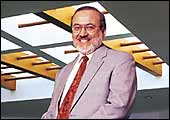 With
three European acquisitions already under its belt and 40 per
cent of its Rs 980-crore sales coming from the continent, Wockhardt's
CMD Habil Khorakiwala says it's the hottest place to be in: With
three European acquisitions already under its belt and 40 per
cent of its Rs 980-crore sales coming from the continent, Wockhardt's
CMD Habil Khorakiwala says it's the hottest place to be in:
Why Europe?
Europe accounts for $7 billion (Rs 31,500 crore) of the total
generics business. The UK, Germany and the Netherlands are
heavily genericised, accounting for 40-50 per cent of the
prescription drugs. Others like France, Italy and Spain are
witnessing some 30-40 per cent growth. But with the issues
of language, regulations and so on, acquisition is a better
route.
What are the characteristics of
the European market?
Each market is different from the other. In the UK, the
chemist buys drugs from whoever gives him the best price and
the patient accepts any product that is offered. But in Germany,
it's the game of branded generics, where you need a medical
representative to go to a doctor and get them prescribed.
There are rumours about you acquiring
another German company...
I can't comment on that at this stage. But we have raised
$110 million (Rs 506 crore) through FCCB (foreign currency
convertible bonds), primarily for acquisitions in Europe.
|
In
may this year, Habil Khorakiwala, Chairman of Mumbai-based pharma
company Wockhardt, coughed up $11 million (Rs 50.6 crore at the
then exchange rate) to snag esparma, an unlisted German drug maker.
It was Wockhardt's third European acquisition in six years, but
with a difference. It only acquired the $20-million (Rs 90-crore)
company's sales and marketing organisation and not its manufacturing
facility. Reason? It already had access to low-cost manufacturing
and R&D in India. What it needed was a marketing arm that could
push its generic drugs (copies of popular off-patent drugs) in Europe's
biggest market for them. Of course, it helped that esparma had 135
marketing authorisations (read: product registrations, something
on the lines of FDA approvals, of which 67 were in Germany), nine
international patents and 94 trademarks. At one stroke, it made
Wockhardt's European operations bigger than India's.
The Wockhardt example only illustrates a trend
that's been snowballing over the last two years-Europe is emerging
as India Inc.'s favourite hunting ground for M&As. Of the 40-odd
overseas acquisitions in the last year-and-a-half, about two-dozen
deals have happened in Europe alone, mainly in the UK, France and
Germany. But it isn't just pharma companies like Wockhardt that
are making a beeline to the continent. Auto-component companies,
polyester giants and it services providers are on the bandwagon
too. Why this sudden rush to Europe?
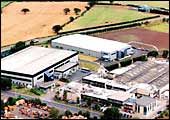 |
| Leap to London: Wockhardt picked up leading
NHS supplier CP Pharma |
Although the rush is across industry, the reasons
are sector-specific. For instance, one view is that Europe is turning
out to be a difficult place to do manufacturing business. It's becoming
more and more of a challenge because of higher labour and environmental
costs there. Says Rajiv Memani, Country Managing Partner and CEO,
Ernst & Young: "Manufacturing businesses find it unviable
to operate in Europe. So there are lots of deals available in Europe
at a bargain than, say, the us." Concurs Raj Bhatt, CEO, Elara
Capital Advisors, a London-based investment bank that has worked
with Indian companies for M&As and stock offerings: "Because
of globalisation, there is a pressure of pricing on European companies.
They are feeling the pinch." The result is that dozens of companies
in Europe are up for grabs. For instance, in the UK, says Bhatt,
any company ranked between FTSE 250 to FTSE 1000 can be an appropriate
fit in terms of deal size for acquisition by an Indian company.
The Cost Calculus
It's not just L.N. Mittal who has mastered
the art of picking up companies in distress and then turning them
into gems. Baba Kalyani, Chairman and Managing Director of the Pune-based
auto-component manufacturer Bharat Forge Limited (BFL), did it too
in November last year, when he acquired a bankrupt, but Germany's
largest, forgings manufacturer, Carl Dan Peddinghaus (CDP) Gmbh.
CDP, which had been under an insolvency administrator (similar to
Chapter 11 of the us), made an easy picking. BFL only had to pay
6 million euros (Rs 32.4 crore then) upfront, and the remaining
23 million euros (Rs 124.2 crore then) was to be paid from cash
generated internally and bank loans. "The seller was more interested
in keeping the company running and protecting jobs," says Kalyani,
who has been able to turn around CDP in just six months.
But the question is, how does a mere change
in ownership make the European facility more competitive? To answer
that question, one has to understand the workings of the automotive
industry. Most automakers, referred to as OEMs or original equipment
manufacturers, work with an established network of suppliers. Because
of several reasons relating to technology, quality and regulations,
it is virtually impossible for a new supplier, even if he offers
a compelling cost proposition, to break into this network. At the
most, a new supplier can hope to crack the "aftermarket"
(for spare parts).
Therefore, acquiring an existing supplier is
an easy way to break into the supply chain without bringing fresh
capacity into the market. It works for the OEMs because they are
under tremendous price pressure and, in fact, have supplier contracts
that stipulate year-on-year reduction in prices. And suppliers can't
do that unless they have access to a manufacturing unit that operates
out of a low-cost country. Says Kalyani, whose acquisition of CDP
makes him the world's #2 forgings player after ThyssenKrupp of Germany,
besides a supplier to blue-chip OEMs like BMW and DaimlerChrylser:
"In the us, the shift to low-cost suppliers happened almost
15 years ago, but in Europe the trend started only three or four
years ago."
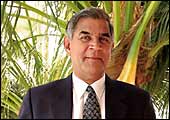 |
|
SURESH KRISHNA
CMD, Sundram Fasteners
|
| With Dana Spicer in its
fold, Krishna's Sundram Fasteners gets access to leading vehicle
manufacturers in Europe |
So when the automakers became desperate to cut
costs and turned the screws on their suppliers, the ones in Europe
found the going getting increasingly difficult, and that opened
the doors for Indian companies to go bargain hunting. Going back
to the question of why Indian ownership of such European units makes
them competitive, it's because when combined with cheaper production
in India, the European output becomes more cost-effective, even
as it offers other advantages such as proximity to suppliers.
No wonder other Indian suppliers have forayed
into Europe too. Delhi-based Amtek Auto made a big acquisition last
year of UK's GWK Group for $37.5 million (Rs 172.5 crore then).
Around the same time, Chennai-based Sundram Fasteners also acquired
the forgings unit of UK's Dana Spicer for $2 million (Rs 9.2 crore
then). Although it's a relatively small acquisition, it gives the
TVS Group company access to the OEM market in Europe. More recently,
in October this year, Delhi-based Sona Koyo Steering Systems acquired
a 21 per cent stake in Faurecia Systems, a steering column manufacturer
in north-eastern France.
Like Wockhardt's, Sona's deal with Faurecia,
first acquired in July by Sona's Japanese partner Fuji Kiko, is
unique. Even though it's a minority acquisition (21 per cent), the
French company (now known as Fuji Autotech) gives Sona access to
European orders. Here's how: The French unit manufactures 2.5 million
steering columns a year, which is about 16 per cent of the European
market. Recently, the company won an order for an additional one
million steering columns, and Surinder Kapur, CMD of Sona Koyo,
hopes to execute at least half of that from his Indian unit. A classic
example of how incremental businesses will be transferred to low-cost
partners.
The French unit also buys components worth
50 million euros (Rs 300 crore) a year (both machined and stamped
components) and Sona hopes to supply at least half of these (machined
components) from India. All told, by 2008, Sona expects to get business
worth 10 million euros (Rs 60 crore) from the French company on
account of its minority acquisition. Kapur is also on the lookout
for new technologies. Fuji Kiko has a company in Sweden that makes
steering columns for commercial vehicles, a segment where Sona has
no presence till now (it is focussed on passenger vehicles). Kapur
expects his board's approval to enter the commercial vehicle space
early next year, which it plans to do in partnership with the Swedish
company.
BABA KALYANI
CMD, Bharat Forge Limited |
|
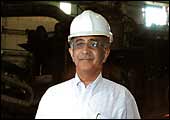 Last
year, Pune-based Bharat Forge picked up one of Germany's largest
forgings companies-Carl Dan Peddinghaus Gmbh-for a steal.
Its CMD Baba Kalyani explains how: Last
year, Pune-based Bharat Forge picked up one of Germany's largest
forgings companies-Carl Dan Peddinghaus Gmbh-for a steal.
Its CMD Baba Kalyani explains how:
How did you manage to strike a
bargain in Germany?
In the last three or four years, the European auto industry
has been looking at global sourcing of components, mainly
from low-cost destinations, as they needed to desperately
cut costs to stay competitive. With OEMs putting pressure
on suppliers, lots of European companies are getting into
trouble, which has given an opportunity to companies like
ours to pick up good bargains. We wanted a wider footprint,
good customers and access to technology.
How easy is M&A in Europe?
The process is fairly complex. It can take one to two years
in Europe compared to a few months in the US. But employees
and management are willing to accept the new order, because
they are mainly concerned about protecting jobs.
What next?
Our objective is to grow inorganically in the focus areas
of chassis and engine components. The European economy will
be bigger than North America in the next five years. So it's
important to be there.
|
The Lure Of Generics
Besides auto-components, the other sector that
has seen a spurt in European acquisitions is pharma, led by Wockhardt
and Ranbaxy. Mumbai-based Wockhardt was one of the first to enter
Europe with its acquisition of UK's Wallis Lab in 1998 for $5 million
(Rs 21 crore then). In 2003, it added to its European presence with
an even bigger buyout-cp Pharmaceuticals, a leading supplier to
UK's National Health Service (NHS), for £10.83 million (Rs
81.2 crore). It makes Wockhardt one of the top 10 generic companies
in the UK. And this year in May, as noted earlier, Wockhardt acquired
German esparma. "With these acquisitions, Wockhardt has a critical
size for a push into the larger European Union," says Chairman
Khorakiwala.
Under the deal signed with esparma's former
owners Nordzucker Group, who did not think pharma fitted in with
its core focus areas of sugar and chemicals, Wockhardt will continue
to manufacture at the German unit (acquired by another firm) for
the next two years, after which it would migrate production to its
Indian or UK facilities. "Our idea is to leverage Wockhardt's
research and technology focus and cost-effective manufacturing strengths
and combine them with the European front end," explains Khorakiwala.
For instance, Germany is the largest branded generics market in
Europe, which accounts for 40 per cent of Wockhardt's sales. That's
as much as what India contributes to Wockhardt's revenues. (The
US and the other world markets account for the remaining 20 per
cent). In Germany, the Indian rush is especially palpable. Says
German Ambassador in India Heimo Richter: "There are around
300 companies in Germany already owned or controlled by Indians,
and the numbers are increasing."
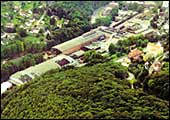 |
| Springboard: Bharat Forge netted the
top German forgings maker CDP |
But the biggest acquisition so far in the pharma
space is Ranbaxy's buyout of RPG Aventis, the France-based generic
pharma company of Aventis, in December 2003. The deal is worth 70
million euros (roughly Rs 385 crore), and straightaway gives Ranbaxy
a 5 per cent share of France's 652-million euro (Rs 3,912-crore)
generics market. In fact, Ranbaxy had made inroads into the European
market with smaller acquisitions like that of Rima Pharma (UK) way
back in 1996 and of Basics (Germany-based generic company of Bayer
AG) in 2000. It's interesting to note that pharma companies prefer
to grow organically in the US, but choose the acquisition route
in the European market. But E&Y's Memani says this trend is
across the industry and not specific to the pharma sector. "In
the us, it's easy to set up a greenfield facility, while in Europe
it's tougher to start operations from scratch so acquisitions are
easier," he says. But there is a flipside. In Europe, restructuring
may not be as easy as it is in the US. For instance, social welfare
rules do not allow companies to cut staff, besides which there are
strict environmental regulations. But that only bothers manufacturing
companies.
IT's On The Bandwagon Too
It may be for reasons of acquiring capacities
(Reliance's acquisition of Trevira, a German polyester manufacturer,
early this year), or for easy market access (Wockhardt' buyout of
esparma), the European acquisition fever has spread across sectors.
In the it products space, i-flex recently concluded a deal with
France's treasury software specialist firm Login SA for picking
up a 33 per cent stake. For i-flex, a banking software product company,
Europe is an important market with 70 of the world's top 100 banks,
including UBs, Rabo Bank, Lloyds, Deutsche Bank and Eurobank in
Greece. Says Rajesh Hukku, CMD, i-flex: "Europe presents a
great opportunity because of the large number of core banking systems
that are coming up for replacement. Secondly, the new countries
that have joined the European Union are also looking to upgrade
their obsolete financial systems."
There are other Indian software product companies
too who have smelt opportunity in Europe. For instance, Bangalore-based
Subex Systems (telecom software space) acquired Alcatel's fraud
management group in July this year while Hyderabad-based Four Soft
acquired Dutch company CargoMate in October. Another Bangalore-based
company Cranes Software, working in the engineering and scientific
domain, too is actively scouting for acquisitions in the continent.
Says Subhash Menon, CEO of Subex: "We went in for customers
primarily and not the product, but there is a lot of growth happening
in the European market."
 |
|
SHYAM BHARTIA
CMD, Jubilant Organosys
|
| Delhi-based Bhartia shelled
out Rs 75 crore for Belgium's PSI to gain a greater presence
in Europe's formulations market |
But in the BPO space, it was HCL that pioneered
its European entry by acquiring British Telecom's Apollo Contact
Centre in 2001. Although Europe has not seen any other Indian BPO
deals since then, HCL has no regrets. The Belfast unit is the largest
BPO firm in Northern Ireland and has grown from 350 employees in
2001 to 1,100 now. "It was very much part of our European entry
strategy. Most of the Fortune 500 companies have significant presence
in the continent and the acquisitions give us credibility for adding
customers," says N. Ranjit, COO, HCL BPO. The company was set
to buy the remaining 10 per cent in Apollo end-November (the total
acquisition price will be £8.8 million or Rs 74.8 crore).
Says Michael Arthur, UK's High Commissioner in India and one who
spends half of his working time meeting Indian CEOs and economic
ministers: "Indian investment in the UK has risen to such a
level that it ranks eighth in the FDA league table of our country."
The acquisition mania is not just in predictable
sectors like software, pharma or manufacturing. Business advisory
may look like an unlikely candidate to catch the European M&A
fever. But the fact is, Mumbai-based CRISIL bought out two companies
in Europe-Economatters, a gas advisory company based in London,
and Irevna, an analytics and equity research firm that has operations
in the UK, the us and India-all in the span of the last one year.
Says R. Ravimohan, MD and CEO, CRISIL: "It was not a deliberate
'geopolitical' strategy. They were looking for buyers and we fitted
in." But, in hindsight, Ravimohan thinks the acquisitions have
panned out well. For instance, Economatters brought in top-drawer
clients such as British Gas, British Petroleum, World Bank, OECD
and Gaz de France. Ravimohan is now looking at adding more capabilities
to his portfolio; the next could be an advisory company in electricity
space.
The relatively easy entry into Europe doesn't
mean it will be smooth sailing for the Indian acquirers. On the
contrary, there are issues they will have to deal with-from regulations
to market liabilities to cultural issues. For example, when Kapur
paid a visit to his French company after he acquired a stake, he
was faced with worried employees, who feared loss of jobs to Sona's
low-cost factory in Gurgaon. While Kapur did manage to allay their
fears, some Indian acquirers will have a harder time doing that.
Then, Europe's strict norms on everything from environment to customer
protection make the Indian acquirer vulnerable to a host of lawsuits
and penalties. Few Indian companies have any experience of dealing
with such issues. But, as India's brave new corporate raiders will
tell you, the benefits of a European presence far outweigh the risks
involved.
|
